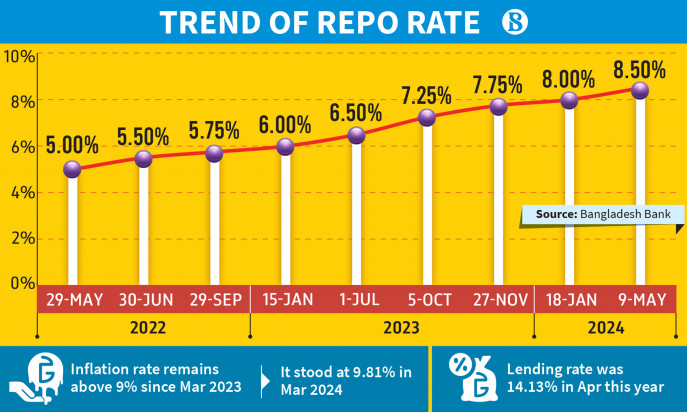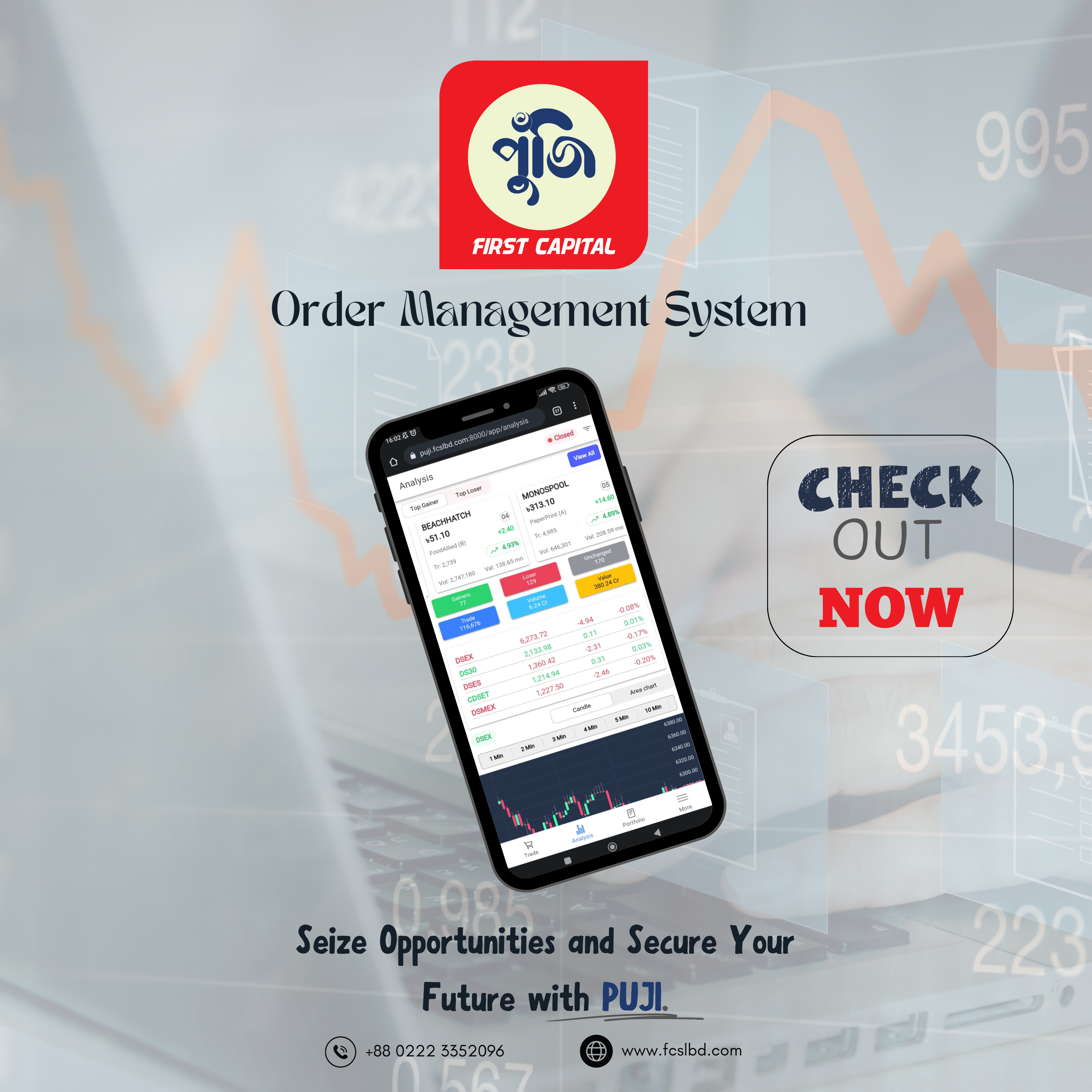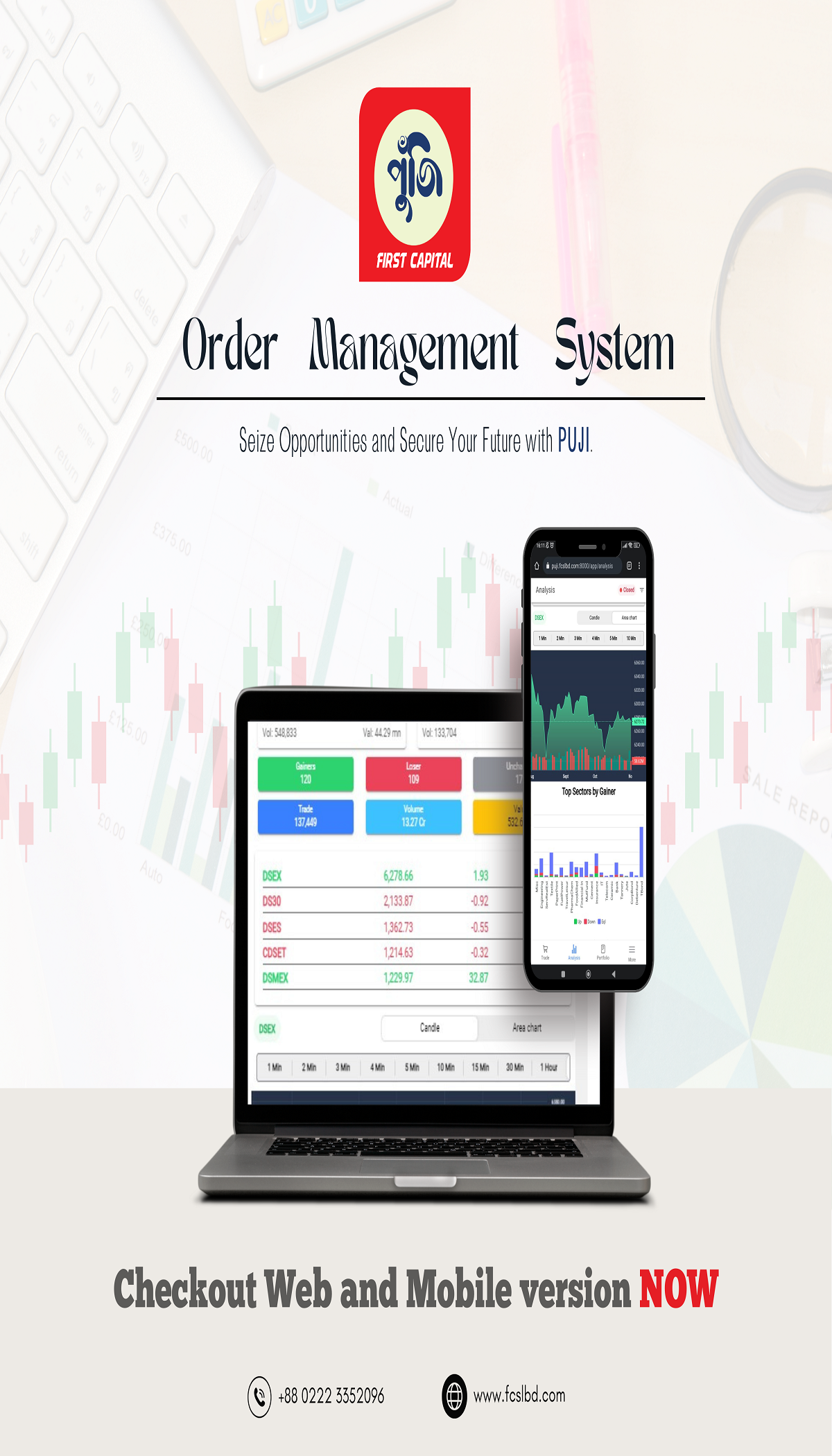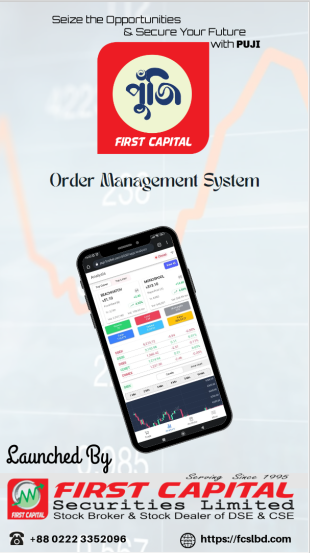The greenback became costlier by Tk7 as the taka was devalued by history’s largest margin yesterday by the Bangladesh Bank when it announced three major policy decisions.
The central bank introduced a crawling peg system for foreign currency for buying and selling foreign currencies, setting the Crawling Peg Mid-Rate (CPMR) at Tk117 per US dollar from the existing Tk110. With this decision, banks can now buy and sell US dollars at their own rates depending on the market.
In a Monetary Policy Committee meeting, the central bank also decided to raise the policy rate by 50 basis points to 8.50% to tighten money flow. This adjustment, along with changes to the Standing Lending Facility (SLF) and Standing Deposit Facility (SDF) rates, aims to stabilise inflation expectations.
The bank’s major policy decisions were taken to address dwindling foreign exchange reserves, tackle inflationary pressures, and shift lending rates towards a market-driven model.
Also, its decision to abolish the Six-month Moving Average Rate of Treasury bill (SMART) reference rate for determining lending rates indicates a significant shift toward market-driven interest rates. It empowers banks to set lending rates according to market dynamics and customer relationships promoting competition and efficiency in the financial sector.
This indicates a gradual transition toward a fully flexible, market-based exchange rate system, in line with global trends and best practices.
While bankers have embraced the decisions foreseeing that these initiatives will facilitate the adoption of market-based rates, businesses have voiced concerns regarding potential rises in operating expenses due to the policy or repo rate hike, as it may lead to an increase in lending rates.
All these major policy changes, set to take immediate effect, were made following a review of the macroeconomic situation, aiming to bolster reserves and manage inflation, according to a press release issued by the Bangladesh Bank.
The central bank also called a press conference yesterday to discuss changes in key monetary policies. However, journalists boycotted the event in protest against the recent entry restrictions imposed by the regulator.
The Monetary Policy Committee addressed two critical challenges that Bangladesh’s economy is facing — persistently high inflation and depleting foreign exchange reserves.

Although the central bank and the government have taken various measures to curb inflation, stabilise the exchange rate, and protect the erosion of foreign exchange reserves, inflation remains stubbornly high and the foreign exchange reserve situation is not improving to the desired level, said the press statement.
The Bangladesh Bank vowed to continue monetary contractionary measures until the inflation target is achieved.
The country’s inflation rate was 7.56% in June 2022 when current Governor Abdur Rouf Talukder assumed office.
In the last two years of Talukder’s regime, the central bank unveiled three monetary policies, aimed at curbing inflation, but these efforts proved ineffective.
Instead, inflation continued to rise, peaking at 9.81% in March of this year, surpassing the government’s target of 7.5% set for FY24.
The overall inflation stood at 9.24% in April, which was 9.33% in March, the highest in the last eight months, according to Bangladesh Bureau of Statistics (BBS) data.
Bankers welcome the new policy
The Association of Bankers, Bangladesh (ABB) has welcomed the central bank’s decision to devalue the taka.
Selim RF Hussain, chairman of ABB and MD & CEO of BRAC Bank, told TBS, “The decision to raise the dollar rate is a commendable step by the central bank as the rate is highly consistent with market dynamics.”
Abul Kashem Md Shirin, the managing director & CEO of Dutch-Bangla Bank, highlighted the positive implications of the dollar rate hike on remittances.
“This adjustment would offer remitters a more favourable exchange rate, encouraging them to send more remittances boosting dollar inflows,” he said.
“Additionally, exporters are expected to reap benefits as well. Previously, we could purchase dollars from exporters at a maximum rate of Tk109.50. Now, we can offer them Tk7-8 more per dollar,” said the banker.
When asked about the potential impact of the rate hike on imports, Abul Kashem said it would not significantly escalate import expenses. Instead, the adjustment would contribute to market stability.
“Importers, who have long grappled with uncertainty surrounding the dollar rate, would find relief as this uncertainty dissipates. Also, determining sale prices of imported goods would become easier,” he said.
Regarding the possibility of the market-based lending rate leading to substantial rate hikes, Kashem said the lending rate will not see a drastic increase.
“Presently, banks are offering a maximum lending rate of 13.55%. However, not all customers are being granted loans at this rate; Favourable rates below 13% are being extended to creditworthy clients. Higher interest rates are only applied to loans perceived as risky,” he added.
Mirza Elias Uddin Ahmed, the MD and CEO of Jamuna Bank, said “With the hike in loan rates, businesses are expected to face increased costs potentially resulting in higher prices for various products.”
He, however, emphasised the necessity of adhering to a demand-supply balanced market asserting that there are no viable alternatives.
Why the sharp rise in exchange rate
The central bank said it will keep the new policies in review and adjust the parameters as needed. The crawling peg system will be an interim arrangement before moving to a fully flexible market-based system in the near future.
The Bangladesh Bank retained the dollar exchange rate at Tk110 artificially for four months since December last year, which caused a faster erosion of foreign exchange reserves.
Though the official rate was Tk110, the market rate was above Tk116. As a result, banks were buying dollars from the central bank to settle import bills. The gross reserve dropped to $19.9 billion on 30 April from $27 billion in December last year, central bank data shows.
Moreover, the Bangladesh Bank was $4 billion short of the $19.26 billion net reserve target set by the International Monetary Fund (IMF) for March performance to get the third tranche of the $4.7 billion loan package.
After going back and forth, the central bank finally introduced the crawling peg devaluing the taka by around 6% in a single day as prescribed by an IMF team visiting to review the progress before releasing the third loan instalment.
Market-driven lending rate after four years
After enforcing a single-digit 9% lending rate cap in April 2020, the Bangladesh Bank later stepped away from this approach. However, it has continued to control rates through SMART until now.
Governor Abdur Rouf Talukder lifted the single-digit cap but introduced another controlling mechanism called SMART in July 2023.
Eventually, the central bank transitioned to a market-driven interest rate, in line with the IMF’s recommendation to increase the cost of money as a measure to control inflation.
Businesses brace for impact
Abdul Majeed, an onion importer in Dhaka, told TBS, “Usually, we settle payments a month after importing onions. With a massive increase in the dollar rate, the payment amount is expected to escalate accordingly. I am bracing for a loss of around Tk50-Tk70 lakh.”
Fazlee Shamim Ehsan, vice president of the Bangladesh Knitwear Manufacturers and Exporters Association (BKMEA), told TBS, “If the dollar rate abruptly jumps, it will lead to an increase in the price of goods. Also, the central bank must monitor banks to ensure they do not charge more than the set rate.”
He said with banks setting their own loan rates, it is imperative to implement measures to safeguard responsible borrowers from any negative repercussions caused by the actions of irresponsible ones.
“Many banks are already charging higher rates for settling import letters of credit than the official rate. By doing so, these banks are making profits up to Tk200 crore, but facing fines of only Tk1 lakh from the central bank,” Fazlee Shamim said, urging the central bank to address this issue seriously.
source: https://www.tbsnews.net/economy/banking/bangladesh-sees-biggest-devaluation-single-day-dollar-rate-raised-tk7-846156
bangladesh bank dollar rate bd




